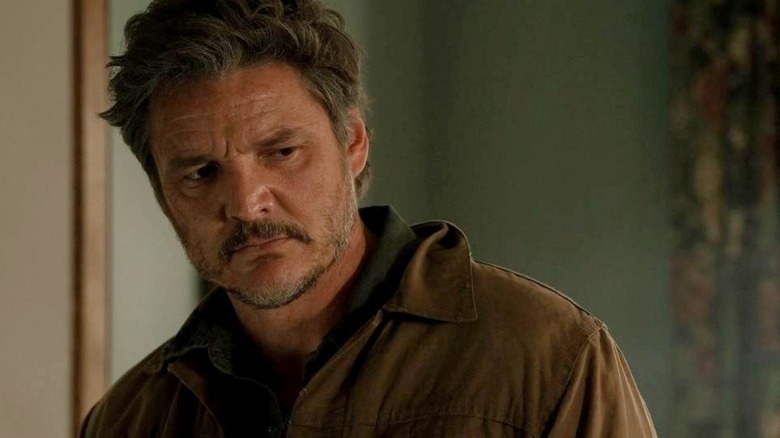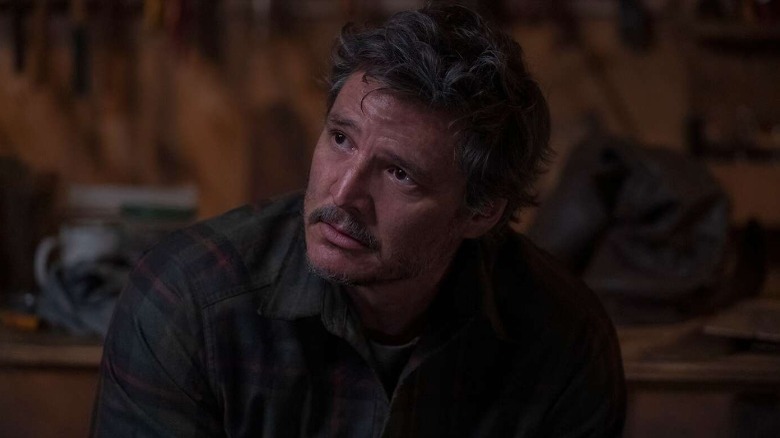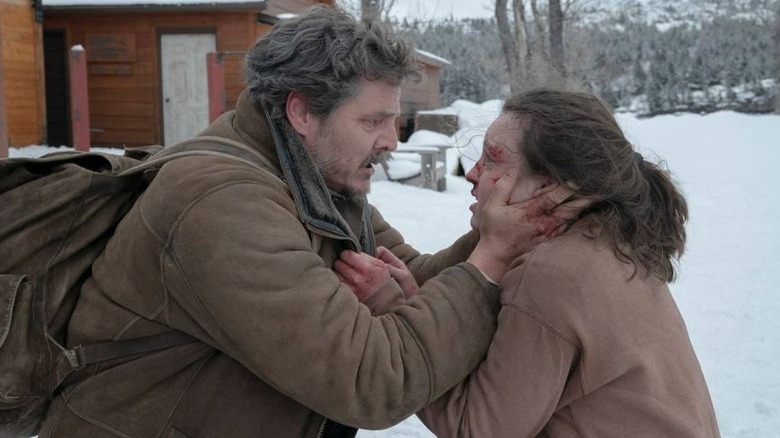The Last Of Us Just Added A Heartbreaking Element To Joel's Backstory
This post contains spoilers for the season 1 finale of "The Last Of Us," as well as the video game source material.
There's a moment in "The Last Of Us" video game that players might miss if they're not careful. In it, Joel and Ellie stumble upon a pair of lovers who seem to have committed suicide in a bathtub. "Guess they took the easy way out?" Ellie observes. "Trust me, it ain't easy," Joel answers.
It's an ambiguous moment that hints at a struggle in Joel's past, one that's never given a name in the hit 2013 Naughty Dog game. But Neil Druckmann and Craig Mazin's HBO adaptation of "The Last Of Us" just gave it a name and a story, all tied together by a heartbreaking performance from Pedro Pascal. In an emotional scene just before the climactic end of the show's first season, Joel admits to Ellie that his hearing loss didn't come from getting shot at, but from trying to shoot himself. He's lived with suicidal thoughts in the years since he lost his daughter, and they only fully subsided when he met Ellie (Bella Ramsey).
The guy who shot and missed
The secret comes out when Joel and Ellie are on the last leg of their journey to the Firefly-controlled hospital where she's due to help make the vaccine that will save the world. The pair clearly aren't ready for what's next, so they slow their pace, taking breaks to stop and talk as they cross the overgrown city landscape. Joel tells Ellie he ended up at an Army medical tent on the second day of the apocalypse, when he got the injury that dulled his hearing in one ear. "Ah, the guy who shot and missed," Ellie says, walking on ahead of him. "It was me," Joel says from behind her. "I was the guy who shot and missed."
This is a bittersweet scene for a half-dozen different reasons. On the one hand, Joel is happier in this episode than we've ever seen him, light on his feet as he finally eases into the role of Ellie's father figure and strips away his emotional distance in the process. On the other, his admission that he wanted to die after Sarah's death is handled with the same quiet pain as so many real-life conversations about a topic like suicide. It's hard for him to talk about, so he says only as much as he needs to. "There's no story. Sarah died and I couldn't see the point anymore, simple as that," Joel tells Ellie. He says he "couldn't have been more ready" when he tried to kill himself, but still flinched at the last second. It's a story we don't get in the video games, but it feels perfectly, tragically in line with everything we do know about Joel.
Joel couldn't save Sarah, but Ellie could save Joel
As raw as this scene is, there's a certain awful poetry to it when you know what comes next in this story. When Joel finds out Ellie's doomed to die for the sake of the vaccine, he doesn't flinch away. He's ready then, too, only instead of hurting himself because he couldn't save his daughter, he's hurting everyone else to save her. The inversion plays out too quickly for us to fully process the connection between the two stories, but when the credits roll to black and we're left wondering why Joel did what he did, the answer is there in that conversation.
"So time heals all wounds, I guess," Ellie tells Joel after he tells her about his suicide attempt. "It wasn't time that did it," he responds, with all the love in the world in his eyes. Pascal has done the best acting of his career in this show, softening a rough character just enough to keep us on his side, but this moment may be his finest turn yet. This is a man who might not survive losing a daughter again, and when push comes to shove, his hurt and love ultimately overwhelm Ellie's own sense of autonomy. "The Last Of Us" is already one of the most profound portraits of father-daughter bonds in recent memory, but with this added detail, it manages to unlock a deeper level of emotion than even the masterpiece on which it's based. In the end, Joel feels he needs to save Ellie not just because he couldn't save Sarah, but also because Ellie saved him.
If you or anyone you know is having suicidal thoughts, please call the National Suicide Prevention Lifeline by dialing 988 or by calling 1-800-273-TALK (8255).


